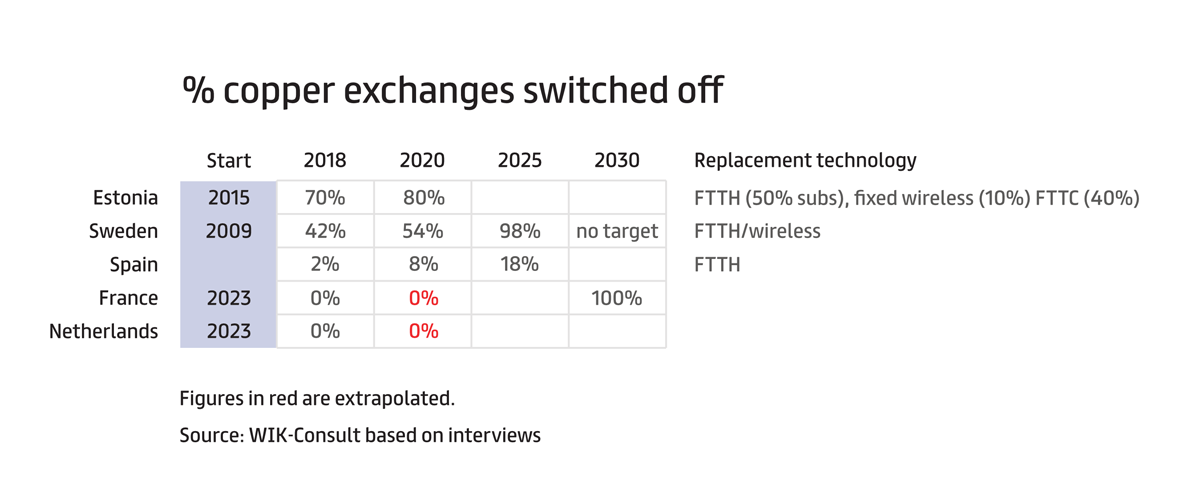FTTH Council Europe study: benefits of copper switch-off

The new FTTH Council Europe study builds on the outcomes of last year’s study prepared by WiK. It highlights benefits of copper switch-off to the environment, society, consumers, investors and operators. The study also examines possible implications for policymakers and regulators as well as challenges and potential solutions to ease the transition to fibre infrastructures across Europe.
Progress towards copper switch-off in Europe remains fragmented. The reluctance of former incumbent operators to invest in fibre access networks is a key constraint in some cases, while challenges in persuading customers and access seekers to migrate have hampered progress in others. Regulatory factors may have further contributed to delays and complexity in some countries that are otherwise ready to make the transition.
Since 2020, Estonia has made the most progress of the ten European countries analysed1. Up to 80% of copper exchanges were switched off in 2020. Sweden has also made significant progress towards migration. Concrete plans to shut copper off have been put in place in France and the Netherlands and discussions are currently taking place in the UK.

In spite of high FTTH/B2 penetration levels, however, the pace of copper switch-off has been slow in Spain and Portugal. Countries such as Germany and Poland have not announced concrete plans. However, the completion of PSTN2 switch-off in Germany is likely to facilitate migration when fibre is widespread.
The research found that copper switch-off and transition to fibre allow for significant environmental, societal and economic benefits:
 |
|
 |
|
 |
|
 |
|
 |
|


“Regulatory and market factors holding back the migration to fibre can be tackled, and we would encourage the Member States and regulators to intensify support to copper and PSTN switch-off and consumer migration to FTTH,” explains Vincent Garnier, Director General of the FTTH Council Europe. “Some of the key steps towards success are: fostering the roll-out of fibre networks in areas where the footprint is still limited, consider ways in which copper pricing can be used as a mechanism to create 100% FTTH coverage and take up and set up labelling or rules on advertising standards to signal benefits of FTTH versus other technologies when consumers are confused or unconvinced of the benefits highlighted.”
“Acceleration of ubiquitous full-fibre-based connectivity will be instrumental in achieving the sustainability and digital targets of the current EU political leadership. Although Europe has made progress rolling out very high-capacity networks (VHCN) in recent years, the pace at which copper is being switched-off remains uneven and slow. The current study is a logical continuation of our 2019 paper, and it provides the latest detailed overview of the legacy network’s retirement and migration to fibre in Europe. Since our initial study, further progress towards copper switch-off has been made in Estonia and Sweden, and concrete copper switch-off plans have been put in place in France and the Netherlands. However, the pace of migration has been slow, even in other countries where fibre is widespread. Other countries, where fibre deployment is limited, are unlikely to be in a position to migrate to fibre in the short term. The new study also confirms that copper switch-off and transition to fibre will provide significant environmental, societal and economic benefits, including reduced CO2 emissions, increased energy efficiency, creation of new jobs, attractive investment cases, and enhanced end-user experience.”

Shortly, we will take a closer look at the drivers and regulations surrounding Copper Switchoff across Europe.
The study Copper switch-off - European experience and practical considerations by WIK for the FTTH Council Europe can be found here.
1Estonia, France, Germany, Italy, Netherlands, Poland, Portugal, Spain, Sweden, UK
2 Fibre-to-the-Home/Fibre-to-the-Building
3 See report on Identifying European Best Practice in Fibre Advertising by WiK for the FTTH Council Europe (2020) available here




